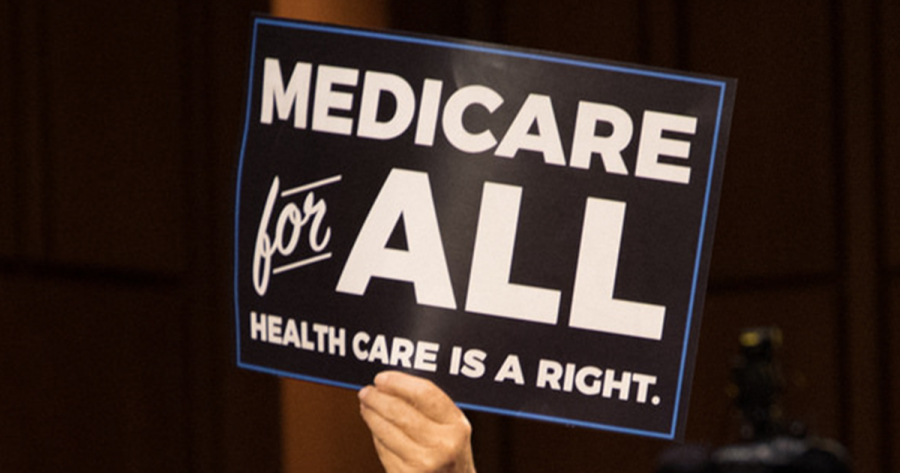Universal Healthcare – Is it as Brilliant as it Sounds?
October 26, 2020
Universal Healthcare is heavily argued as a basic right for all people. Aligned with this idea, Senator Bernie Sanders has famously developed a bill regarding a single-payer, universal healthcare system.
Going by the name the “Medicare-for-All act of 2019,” the bill would replace the current public healthcare sector, including Medicare and Medicaid. It would also heavily reduce the private sector (private health insurance companies) and their ability to provide healthcare to the United States. In fact, they would only be able to provide coverage for services not covered by the proposed Medicare-for-All plan.
Furthermore, Medicare-for-All would eliminate all out-of-pocket medical spendings, such as co-pays, premiums, and prescription drug costs.
According to the U.S. Census, these forms of medical spending are the number one cause of bankruptcy in the United States that affect nearly 52 million adults. This makes it important to note that bankruptcy directly correlates to decreased mental health, according to a study done by the US National Library of Medicine. Bankruptcies have also been proven to heavily reduce the chances of getting a new job, says Daniel Kurt, a writer for Investopedia. From this information, it can be concluded that Medicare-for-all would greatly improve the lives of those affected by medical bankruptcies.
To provide basic access, Medicare-for-All would provide basic, primary-care-based health insurance to all United States residents. This would include all of the currently insured population and the uninsured. In 2019, the U.S. Census found that there were “26.1 million [people who] did not have health insurance at any point during the year.” Providing this population with healthcare could reduce mortality rates, as the uninsured population has been associated with delaying care, causing them to go without preventative care. Lack of preventative care leads to medical conditions going unrecognized in the earlier stages. This is a major problem as by the time this population gets to a doctor their condition may have worsened to the point of no cure. This delaying care behavior has also been associated with the United States’ privately insured population, the main reason being cost. By getting rid of the very reason for delaying care, Medicare-for-all has the potential to save millions of lives.
However, although Medicare-for-all comes with several benefits, it comes with just as many concerns.
Funding has been a major cause of concern associated with this bill. Linda Blumberg of The Urban Institute finds that “federal spending would increase by $34 trillion over 10 years [for the plan to be implemented.]” Over the years, the US federal government has turned towards deficit spending, also known as spending money that they do not have to pay for such programs. However, continuing to deficit spend can bring out some dangerous consequences, considering that the national bureau of economic research finds that, as of June 2020, the United States is currently in a recession. They further say that this is the “worst economic downturn since the great depression.”
In this current situation, one of the several terminal consequences of continuing to deficit spend is the inability to recover from this recession. James Mcbride of The Council on Foreign Relations finds that “massive debt accumulation could. . .erode Washington’s ability to respond to future crises. Another major financial crisis, like that of 2008–2009, could require new large-scale stimulus spending, a response that would be difficult given the U.S. debt load.” Getting out of this recession is of utmost importance as if we look towards the consequences of the 2008 recession, “unemployment rates skyrocketed, housing prices and stock portfolios plummeted, and the lives of millions were disrupted. By some measures, over 30 million individuals lost their jobs, and the rate of long-term unemployment doubled its historical high,” as said by Arne Kalleberg of the US National Library of Medicine.
If we consider the economic and social effects of the COVID-19 pandemic, all consequences mentioned would only be exacerbated.
Another form of funding associated with the bill is increased taxes by nearly 20%. Recognize that such a tax is problematic since a near majority of Americans are barely able to make ends meet. Alicia Adamczyk of CNBC tells us that “One-third of middle-income adults [or 71 million people] do not have enough savings to cover an unexpected $400 expense without selling something or borrowing money.” A 20% tax hike would most likely be much higher, leaving these 71 million people at risk of going down the poverty line.
A third major concern regarding Medicare-for-All is a potential decrease in the quality of healthcare. By providing healthcare to the entire nation, the demand for doctors, drugs, and treatment would likely increase. Medicare-for-all would also require hospitals to shift their focus towards primary care, meaning that specialized care treatments such as chemotherapy would be receiving less attention by hospitals, increasing wait times for those with chronic illnesses.
“I think that we should have Medicare for all because it is going to be helping the community,” says Sophomore Siddhi Jadhav. “People will not have to pay for private insurance companies. Therefore, families will not have [debt-causing] medical bills to pay because of Medicare for all.”
“Medicare is great for only the people who do not already have private healthcare,” says Wayne Hills sophomore Harman Kohli. “For anyone able to afford healthcare, it would overall decrease the quality of healthcare, like in England with long waiting lists for primary checkups. However, there is also an alarming number of uninsured Americans. Instead, the solution should be to expand public healthcare coverage to fill this gap.”







